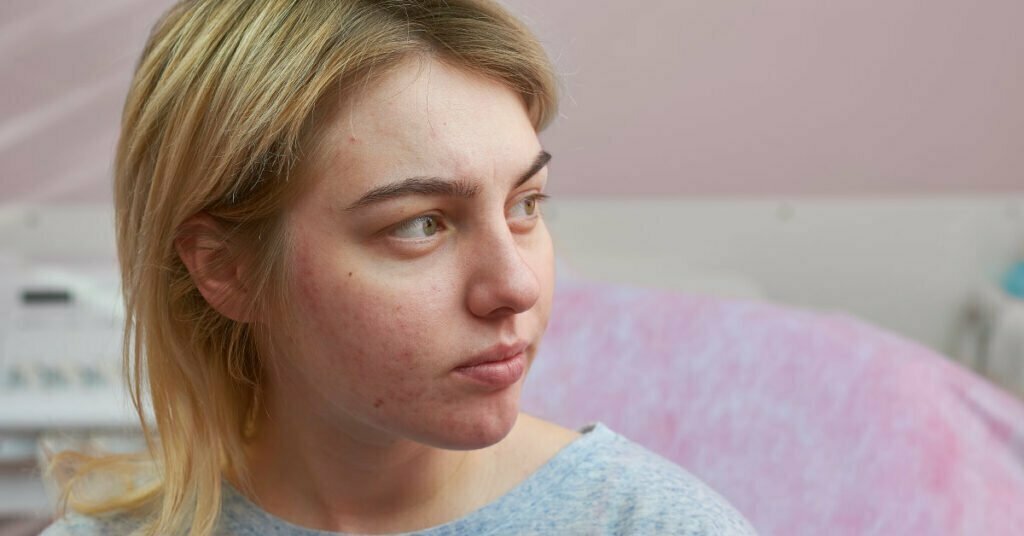The symptoms and severity of skin problems vary widely. They might be temporary or permanent. Some are caused by circumstances, while others may be inherited. Some skin disorders are trivial, while others are potentially fatal. Regardless of these factors, skin disorders could have a negative impact on someone’s quality of life. Let’s take a look at the common skin conditions. Later I will also discuss their impact on your mental and physical health, and how telepsychiatry and remote patient monitoring (RPM) could help.
Acne
Acne is a common skin ailment that produces pimples on the face, forehead, chest, shoulders, and back. Genetics, changes in hormone levels, high stress level, climate factors like humidity, food and the use of wrong personal care products are all possible causes. Acne is most frequent among teenagers, but it can strike anyone at any age.
Acne is not contagious, but you should not share personal skin care products or cosmetics to avoid the transmission of acne-causing bacteria. It is recommended to use skin care products that are labeled “non-comedogenic” or “won’t clog pores” since these products don’t cause breakouts in most people.
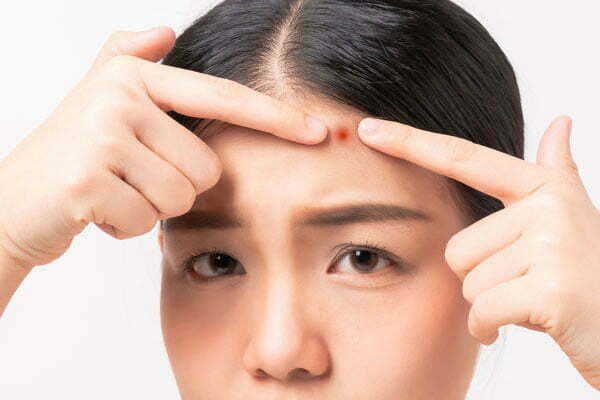
Psoriasis
Psoriasis a chronic disease with no cure but is not contagious. Itching and irritation are the common symptoms. The most common type of psoriasis is plaque psoriasis, which creates thick, scaly patches of skin. Psoriasis affects around 7.5 million people in the United States. Psoriasis affects people of all ages, but it is more common in adults, with the maximum prevalence between the ages of 45 and 64.[1]
While there is no cure for psoriasis, it can be managed with medication. Psoriasis creams or shampoos may be prescribed by your doctor.
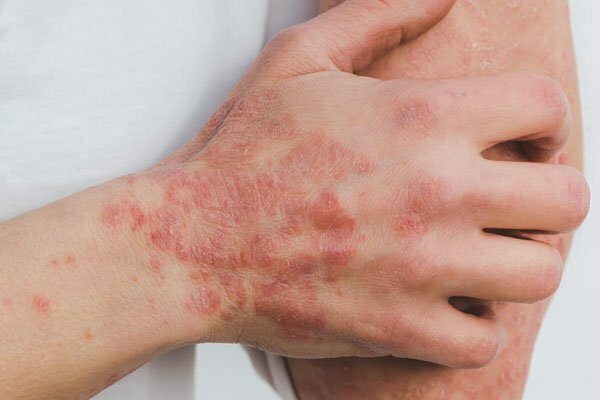
Rosacea
Rosacea is a non-contagious skin condition that causes redness on the nose, chin, cheeks, and forehead. It primarily affects the facial skin. Small pus-filled lumps may also appear. These signs and symptoms may appear for weeks to months before disappearing. According to the American Academy of Dermatology, rosacea affects at least 14 million adults in the United States, or around one out of every ten people. The National Rosacea Society (NRS) estimates that there are now 16 million people living with Rosacea.[2]
People with rosacea should pay attention to skin irritants like cleansers, creams, and makeups. Avoid products that dry skin such as products with alcohol, fragrances, witch hazel, menthol, camphor, peppermint and the like. You are also advised to use sunscreen every day. Sunlight is a trigger for many people with rosacea.
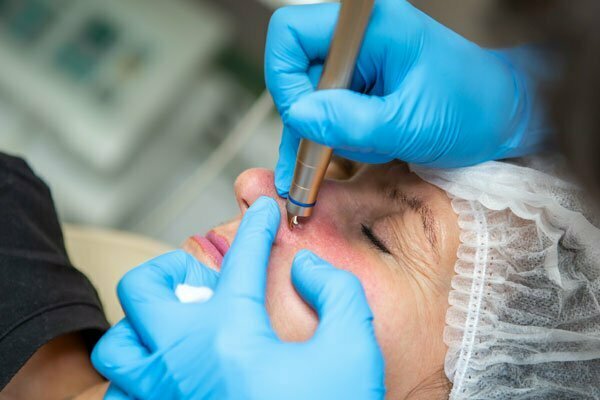
Eczema
Eczema is a group of skin conditions that cause inflammation and irritation. Atopic dermatitis, often known as atopic eczema, is the most prevalent kind. The term “atopic” refers to a person’s proclivity for allergy diseases like asthma and hay fever. Eczema affects approximately 10% to 20% of infants and 3% of adults and children in the United States.[3] Some people will experience symptoms on and off for the rest of their lives.
Although there is no cure, most patients can control their symptoms by seeking medical help and avoiding irritants. Eczema is not contagious.
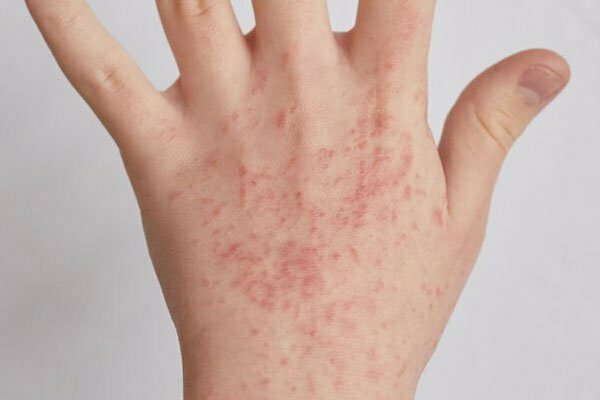
Vitiligo
Vitiligo is a long-term skin disorder in which pale white patches appear. It’s caused by a lack of melanin, the pigment that gives skin its color. Vitiligo can affect any part of the body, although it is more common on the face, neck, and hands, as well as in skin folds. The illness affects up to 2% of the population, or 2 to 5 million people in the United States.[4]
Pale skin is more susceptible to sunburn, so it’s critical to take extra precautions and apply a sunscreen with a high sun protection factor when out in the sun (SPF).
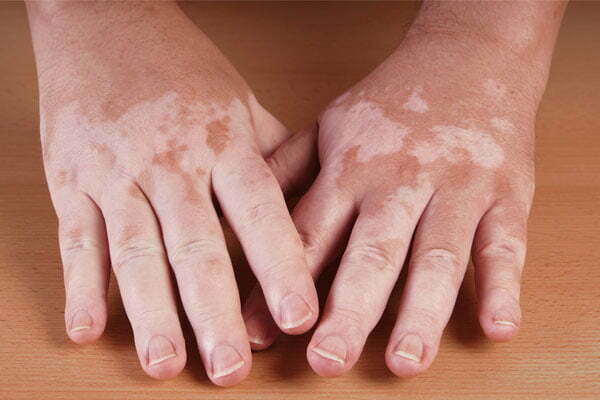
Skin disorders can lower self-esteem and cause social withdrawal. How can you manage the effects of having chronic skin conditions on your physical and mental health?
Skin disorders can have serious physical, psychological, and social impacts for persons who suffer from them, as well as their caregivers and family members. Physical symptoms vary in nature, yet they all have the ability to affect one’s mental health. Those who are not directly impacted by skin illness have a tendency to discriminate or stigmatize them. Some people don’t want to socialize with them; their apathy or dislike is sometimes exacerbated by the misconception that skin illnesses are contagious or caused by poor hygiene.
Stress, worry, anger, despair, shame, social isolation, low self-esteem, and embarrassment are all common psychological difficulties related with skin disease. In some cases, these skin problems can have an impact on one’s personal, professional, and social lives.
Those who have a physical health problem have an increased risk of having behavioral and mental health challenges. According to a research, skin illness is linked to a higher risk of drug and alcohol abuse. Suicidal attempt is also more common among those with skin diseases, according to research.[5]
What’s more? Keep reading…
Mental illnesses and chronic physical conditions may co-exist. People who suffer from a major mental illness are more likely to develop a variety of chronic illnesses such as hypertension, diabetes, and obesity. It could also be the other way around: People with chronic physical health disorders may suffer from depression and anxiety. Co-existing mental and physical problems can lower quality of life, prolong sickness, and worsen health outcomes.
What’s the bottom line?
Ultimately, people with skin diseases should get enough knowledge about their conditions, medical attention or preventive treatment, support from their care givers, family and friends. Be educated about your condition and educate people around you too. It might be hard to deal with misconceptions about skin disorders but you are not alone in this battle. Don’t be afraid to ask for professional help.
Still don’t have the confidence to go out and see a doctor? Telepsychiatry and Remote Patient Monitoring Solutions could help.
These are one of the most important recent developments in contemporary medicine, allowing doctors to diagnose, monitor and treat patients without having to see them in person.
In recent years, telepsychiatry and remote patient monitoring have become remarkably significant due to the increased innovation of digital technologies and the response to the COVID-19 pandemic. Telepsychiatry could be a great help for people who have skin diseases and for those who suffer from mental conditions who do not feel comfortable with face-to-face consultations. Patients’ desires for private, convenient, affordable, and easily accessible mental health services are met through video-based telepsychiatry, a subset of telemedicine.
Remote Patient Monitoring, on the other hand, can also play a significant role in chronic care management. RPM technologies allows patients to monitor their vital signs at home and transmit those health data back to their providers or it could also be automatic through the use of wearable technologies. When episodes of mental illness begin to develop, RPM can help monitor patients remotely and prevent them from becoming severe. RPM for mental health is in in its early stages, but it is expected to improve significantly in the future years.
Read more: Remote Patient Monitoring for Patients with Mental Health Conditions
References:
- Skin Conditions by the Numbers. (n.d.). Skin conditions by the numbers. https://www.aad.org/media/stats-numbers.
- Helwick, C. (2013, July 30). Rosacea: A Misunderstood, Serious Medical Condition. American Health & Drug Benefits. https://www.ahdbonline.com/payer-perspectives-in-dermatology/1469-article-1469.
- Eczema: Types, Symptoms, Causes, Diagnosis, And Treatment. (2021, March 2). WebMD. https://www.webmd.com/skin-problems-and-treatments/eczema/atopic-dermatitis-eczema.
- Vitiligo: Symptoms, Causes, Treatments – WebMD. (2020, August 17). WebMD. https://www.webmd.com/skin-problems-and-treatments/guide/vitiligo-common-cause-loss-skin-pigment.
- The Psychological and Social Impact of Skin Diseases on People’s Lives. https://www.appgs.co.uk/publication/view/the-psychological-and-social-impact-of-skin-diseases-on-peoples-lives-final-report-2013/
- Image of rosacea: https://www.twenty20.com/photos/5f13b71b-22f8-4640-b966-080ee4901cdb/?utm_t20_channel=bl
- Image of eczema: https://www.twenty20.com/photos/c5735b53-16cf-408d-b3a5-7f691a3c21ac/?utm_t20_channel=bl
